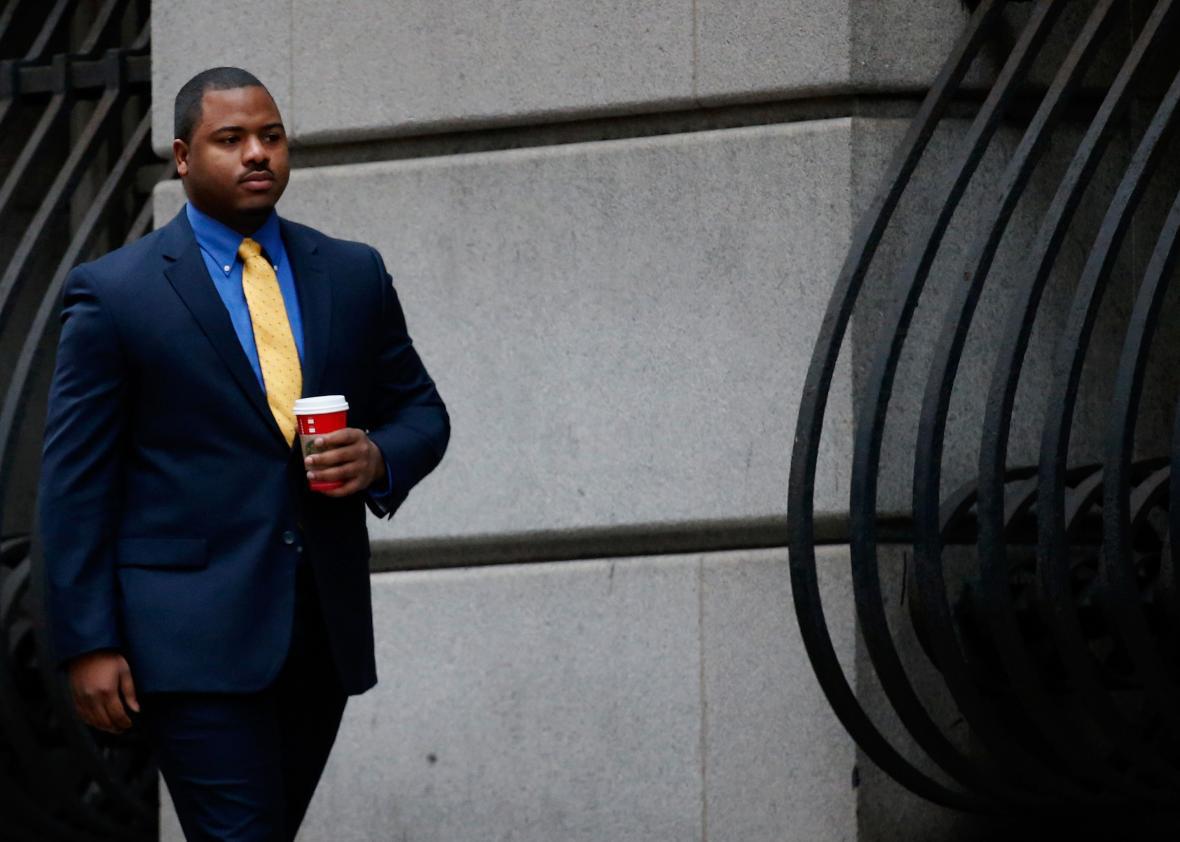Jury selection in the trial of Officer Caesar Goodson, who drove the van in which Freddie Gray was allegedly killed, lasted about a minute on Monday before Judge Barry Williams postponed the trial indefinitely. The reason? Williams had ordered Officer William Porter to testify against Goodson—but because Porter himself was also allegedly involved in Gray’s death, and will soon be retried for manslaughter, an appeals court blocked the order to testify with a temporary injunction. Now the case cannot proceed until that appeals court rules on Porter’s eligibility to be forced to testify as he awaits his own trial. (The jury in the first trial against Porter couldn’t reach a verdict.)
Williams granted Porter limited immunity in exchange for his testimony, asserting that nothing Porter says on the witness stand will be used against him during his June trial. Porter balked, insisting that his compelled testimony violated his Fifth Amendment right against self-incrimination. Now the Maryland Court of Special Appeals will wade in to decide whether Williams can legally compel Porter’s testimony. In the meantime, Goodson’s trial will remain postponed.
Let’s break down the thorny legal issues at play here. The Fifth Amendment to the United States Constitution guarantees that no person “shall be compelled in any criminal case to be a witness against himself.” Most obviously, that means that a defendant cannot be forced to testify at his own trial. It also means that witnesses cannot be forced to testify about any matter that may incriminate them. Prosecutors typically work around this problem by offering witnesses immunity in exchange for testimony. In 1972, the Supreme Court held that the government can even force witnesses to testify—if they have been granted immunity that protects them from self-incrimination. In other words, the government can make a witness testify about some self-incriminating matter, so long as it also promises not to later use that information against the witness himself.
Porter’s argument, then, is simple: The government can’t realistically promise not to use his testimony against him, because the government already plans to try him again for his own involvement in Gray’s death. Put simply, the government is demanding that Porter potentially confess about his involvement in a possible murder—while swearing it won’t use his confession in his future trial. Porter argues that the government’s position is silly: Once he has testified, the government will know the scope of his alleged wrongdoing, and will inevitably use this information while trying him in June. Even if prosecutors do not explicitly reference facts from Porter’s testimony, Porter claims, they may use the information gleaned from it to build a stronger case against him. No matter what, if Porter does testify, an eventual guilty verdict against him might not stand. Porter could easily appeal, arguing that his compelled testimony infected the prosecution. The ensuing legal headache might drag on for years.
I’m sympathetic to the prosecution’s desire to bring Gray’s purported killers to justice, and I appreciate their efforts to put Porter on the witness stand. But at this stage, the legal maneuver simply seems impractical, delaying the trial and shifting the focus to a constitutional sideshow. The state should either scrap its plan to retry Porter, then grant him full immunity, or abandon its efforts to compel his testimony and hope other witnesses can persuade the jury of Goodson’s guilt. By attempting to try both Porter and Goodson in this manner, prosecutors risk creating the impression that they are cutting constitutional corners. According to their theory of the case, Goodson is more culpable for Gray’s death than Porter, anyway. If Porter’s testimony is truly essential for Goodson’s conviction, the state should drop charges against Porter in exchange for his oath to take the stand against Goodson.
